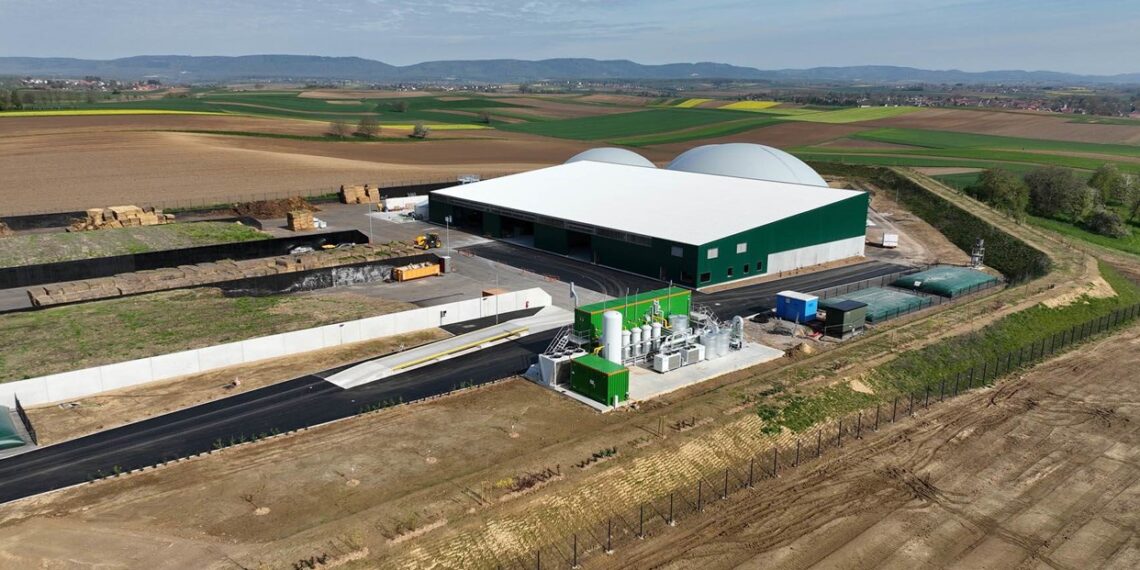ETW Energietechnik from Moers has built a biomethane plant in Rittershoffen, in Alsace, in cooperation with the planning office Rytec from Baden Baden. The processing capacity of the plant, which went into operation in February 2023, is about 700 normal cubic meters of raw biogas per hour. This means that up to 350 normal cubic meters of biomethane are fed into the natural gas grid every hour. This is roughly equivalent to the average fuel consumption of 20,000 passenger cars.
The project was initiated by three young, visionary farmers from Alsace who are committed to environmental protection and regenerative energies and want to promote sustainable agricultural use in the region. Only agricultural residues from the immediate surroundings are used as substrates.
Especially the low power consumption of 137.6 kilowatts electric makes ETW‘s plant state of the art for biomethane plants of this size class. This significantly reduces the risk of future electricity price increases. Even with a downstream high-pressure compression plant, which compresses the processed biomethane to 67.7 barg (bar gauge) and feeds it into the natural gas grid, the power consumption of the entire plant is less than 202 kilowatts electrically, significantly lower than comparable products on the market. This means that the entire plant consumes less than 7 per cent of the energy provided by the biomethane.
As early as 2016, the first considerations were made to realise the project. In 2019, the concrete design and planning work began. The approval, application for funding, construction financing and earthworks were all carried out by the Rytec company from a single source. The maximally reduced interfaces allowed the construction work to progress quickly and effectively. The biogas plant will create three jobs in the region. The residents of the neighbouring village of Rittershoffen initially expressed concerns during the project development. In response, however, the entrepreneurs invested a lot of work and money to ensure that the plant was well integrated into the landscape.
„As a family business that has traditionally specialised in growing fine crops such as asparagus and horseradish, the sustainable development of our region is an important concern for us. Therefore, it was particularly important to us that the integration of the biogas plant is not only in line with our company philosophy, but also offers a green added value for the entire region, “reports Denis Scharrenberger, Managing Director of Ferme Scharrenberger.
The location of the biomethane plant is now off the road at a sufficient distance from the adjacent village – planted with a wall around the property as well as high-quality native trees and hedges. To accommodate the local residents, extensive earthworks as well as longer power lines and pipelines were invested in here.
When designing the plant technology for the fermentation of the diverse residual materials, a lot of emphasis was placed on the highest quality. The ETW SmartCycle biomethane plant from ETW Energietechnik is correspondingly high-quality, reliable and low-maintenance. Thanks to the use of oil-free screw compressors and an intelligent plant control system, the plant has the lowest energy consumption on the market.
Prefabricated parts from Drössler Umwelttechnik with factory-concreted installation parts such as FF pieces and agitator frames were also used for the concrete. All built-in parts have additional sealing flanges. The sandwich construction of the tank walls is optimally thermally insulated and already fitted in the factory with integrated heating pipes protected by the concrete.
The stirring and separation technology was carried out by the Paulmichl company. The agitators are equipped with powerful external drive technology. Especially the fermenter agitator Mammut convinces at the Rittershoffen plant with a strong agitating performance at a high dry matter content. Thanks to the infinitely variable hydraulic adjustment of the agitators, optimal adaptation to the fermenter substrate can be achieved. The panorama sight glasses developed by Paulmichl provide the operators with visual insight and monitoring of the plant operation. The reliable separation operation at the Rittershoffen plant is carried out by a separator of the PM260 model series, which is specially adapted to the fermentation residue. By means of pressure control of the separator, the feed pump is controlled in its flow rate, so that operation can take place without a feed tank and overflow pipe.
The gas storage tanks from Sattler, who have almost 45 years of experience in this field, have an enormously high tensile strength and extremely low permeability. With the BioG solids dosing system, more demanding residues such as straw and manure can be introduced in liquid form. The system in Rittershoffen consists of a 190 cubic meter BioFeeder. The subsequent BioMerge mixing system (market launch 2022) mixes fermenter liquid with the shredded material and pumps it through an eccentric screw pump as a homogeneous mass into the fermenter. Stones as well as other foreign bodies are successfully separated in the overall system. This helps to reduce the wear and tear on the pumps as well as on the downstream technology.
Gate valves and measuring technology are each double-protected, so that the plant is equipped with the highest safety standards of the Rytec company. With the low-energy gas processing plant from ETW Energietechnik, the frequency converters from Rytec and the future CO2 liquefaction, the bottom line is that a negative CO2 footprint is generated.

















